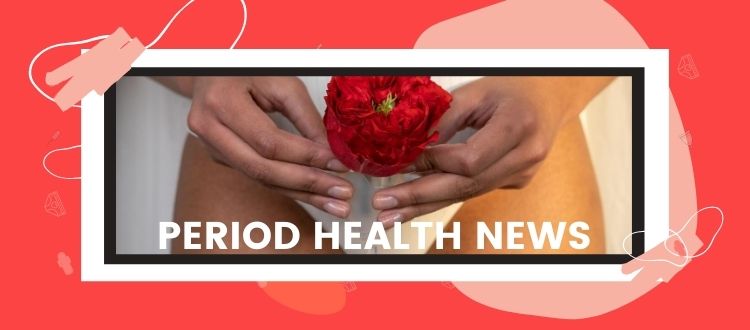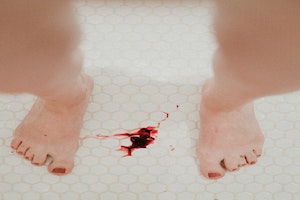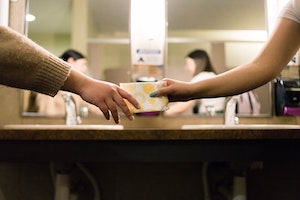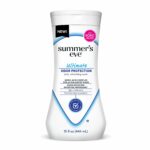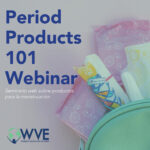PERIOD HEALTH NEWS: February 2021
WVE’s Our Stories, Our Flow workshops are interactive community conversations to center and de-stigmatize the way we talk about, experience, or have experienced menstruation AND to understand safe, sustainable reproductive health products for all ages.
YOU can help expand the reach and understanding of menstrual equity in your community by leading your own OSOF workshop! WVE has created a training toolkit to help you bring important conversations about periods to your own communities. We also know that each community is unique and so is each conversation — so our training resources and workshops are specifically designed to be customizable and adaptable to your audience and needs.
TO LEARN MORE and SIGN UP for the toolkit – click here!
—————————————————————————
(a blog by NARAL Missouri)
A quick Google search for ‘menstrual pad’ credits its invention to Benjamin Franklin. But don’t believe everything you read; this revolutionary advancement in reproductive healthcare was actually developed by a Black woman by the name of Mary Beatrice Davidson Kenner.
In 1957, Mary Beatrice Davidson Kenner, filed for her very first patent: a belt for sanitary napkins, an idea she created when she was 18 years old, long before the modern-day maxi pad. While tampons were readily available to women during the 1930s, they were deemed too “indecent” for regular use. As a result of these restrictive societal expectations, along with the stigma surrounding menstruation, women were often confined indoors during their periods.
—————————————————————————
Absenteeism and Menstruation: A Worldwide Problem
There is still no rubric in education that helps familiarize female students with menstration and how it can impact their educational lives. Education about women’s health for men is even scarcer. Men’s understanding of the menstrual cycle is rarely above the basics of the biological process. Read more.
Doctors puzzled as to why coronavirus is affecting some menstrual cycles
Alexandra Plazas-Herrera is estimated to be one of the estimated ten percent of women for which Survivor Corps, a support group for those recovering from COVID-19, surveyed who reported issues with their menstrual cycle after being infected with SARS-CoV-2. Read more.
————–
Whitmer rolls out plan to ax ‘tampon tax’ without squeezing school funding
“After combatting a global public health crisis for nearly a year now, it’s more important than ever to make sure people can access the affordable care they need. That’s why in 2021, there is no reason we should still be forcing people who are taking care of their reproductive health to pay more for this necessary care,” Whitmer said. Read more.
The Fight for Menstrual Equity Continues in 2021
These may sound like baby steps compared to the news of sweeping nationwide change across the pond, but a winning domestic agenda entails a mix of federal, state, and local interventions that intertwine and unfold just like this. I’m more optimistic than ever that the stage is now set for transformation this year. Read more.
—————————————————————————
By: Robin V. (WVE Member)
I couldn’t hide the fact that I had hit menarche. The evidence was all over my clothes. My mother showed me how to treat the blood stains so that they would not become permanent but would come out when the clothes were washed. We didn’t have much money. We definitely qualified as poor, so saving the clothing was very important. My mother found me a belt and a pad and treated the entire situation in a very calm no-big-deal way.
My father was another story.
When Da saw Ma and me working on the stained clothes, he immediately asked what had happened. Ma said “Robin got her period.” Da was elated — so elated that he began making calls to all of our extended family and even some close family friends that each began the same way: “Robin fell off the roof”(an expression that I had never heard before). Ma and I both tried to get him to stop making the calls. Da couldn’t see what the problem was.
That is how menarche became one of the most embarrassing times in my life, and I have lived 59 years since then. And it would never have happened if my father hadn’t made all those phone calls, embarrassing me with people who weren’t even there.
Advice for parents/caregivers: please don’t do this to your girls.
————–
Do you have a period story to share? By creating dialogues about very real and normal things people go through, such as menstruating, we are effectively dismantling the stigma (de-stigmatizing) of menstruation. Yep – talking abut periods is that powerful! Zap us your stories to be featured on our website, social media, or in our next newsletter. CLICK HERE!
—————————————————————————
When you sign up to give $10 or more per month, you’ll receive a special #myperiodnoshame bag filled with eco-friendly period products from our partners!
JOIN THE MOON CLUB!

